Stay in the know on all smart updates of your favorite topics.
The Amsterdam Hunger Game

Learn with the case study Amsterdam to anticipate future food disruptions. Understand the city's food supply chain vulnerabilities is critical for enhancing food resilience. Enhance food resilience in empowerment of people in urban food growing.
Toekomstverkenning publieke platformen

Wat is de impact van (platform)technologie op de overheid van de toekomst en haar rol in de (door o.a. technologie) veranderende samenleving? Wil jij de toekomst tastbaar en beeldend maken en meedoen met een groeiende beweging van jonge (t/m 35 jaar) visionairen, denkers en doeners?
Doe dan mee aan de toekomstverkenning publieke platformen georganiseerd door FUTUR en Provincie Zuid-Holland en ondersteund door Scape Agency.
Vanuit verschillende thematische invalshoeken gaan we hiermee aan de slag in groepen van ongeveer 10 jonge professionals vanuit verschillende organisaties (Publiek, privaat en kennis). Een beschrijving van de eerste thema’s vind je hieronder:
Thema's
- Circulair 2050 - De ambitie om in 2050 niet alleen klimaatneutraal, maar ook nog eens onze economie 100% circulair in te richten, vergt een omslag in denken en doen. Hoe buigen we lineaire ketens rond? Waar beginnen we? En cruciaal: welke rol speelt het publieke platform in deze transitie?
- Zicht op maatschappelijke vraagstukken met data – Data is onmisbaar voor het oplossen van maatschappelijke vraagstukken. Hoe zetten we data verantwoord in voor het benutten van deze kansen?
-Digitale Waterschappen – Bestuurt AI in 2050 het waterbeheer, of wordt water juist lokaal beheert?
-Ambtenaar van de toekomst – Als steeds meer taken worden overgenomen door (platform)technologie, wat is dan de rol van de ambtenaar van de toekomst en welke vaardigheden worden gevraagd?
- Participatie – hoe kan de overheid betrokkenheid van inwoners, bedrijven en maatschappelijke organisaties vormgeven bij beleid en besluitvorming?
- Uitvoering van de toekomst – De meeste publieke dienstverleners leveren een stand van de uitvoering aan. Hoe moet de uitvoering en publieke dienstverlening van de toekomst worden vormgegeven?
- Online leefwereld van jongeren – Welke publieke waarden moeten vooropstaan op social media, hoe ziet een dergelijk platform eruit en welke digitale vaardigheden van jongeren zijn cruciaal?
- Tomorrows Governance – hoe verandert de rol, organisatie en wijze van samenwerken van de overheid?
- Mobiliteit en Brede Welvaart - Wat is de impact van (platform)technologie op de bijdrage van mobiliteit aan de brede welvaart van mensen door de bereikbaarheid van banen, voorzieningen en sociale contacten in de stad, en de regio?
- Sociaal Domein – Hoe kan platformtechnologie bijdragen aan de complexe problemen in het sociaal domein? Hoe ga je toe naar een overheid die er voor de inwoner is, in plaats van de inwoner van het kastje naar de muur stuurt.
- Ethiek
Zijn een van die thema's iets voor jou? Meld je dan aan via: https://kennislab.typeform.com/to/MRNbvgIl
Wat betekent meedoen?
- Je sluit je aan bij een themagroep. En doet mee in de voorbereiding, dus het verzamelen van voorbeeldcases uit eigen werk, rapporten, studies, literatuur, films enz.
- Je doet op 13 februari mee met de visiedag (09:00 - 13:00), en bij voorkeur ook de aansluitende verbeeldingsdialoog in het Provinciehuis van de Provincie Zuid-Holland in den haag. Op deze dag werken de themagroepen met ondersteuning van ontwerpers en kunstenaars hun toekomstbeeld uit.
Je bent in maart beschikbaar voor 1 digitale of fysieke sessie voor de verdere uitwerking van het toekomstbeeld.
- Je bent op 4 april aanwezig (vermoedelijk enkel de middag) bij het slotevent ‘publieke platformen’ georganiseerd door de provincie Zuid-Holland in het provinciehuis. Op 4 april ‘exposeren’ de groepen hun toekomstbeeld aan een breder publiek, en wordt er op verschillende manier een dialoog georganiseerd tussen bezoekers, experts en bestuurders.
- Je vergroot je netwerk, je doet inspiratie op voor de vraagstukken waar jij dagelijks mee bezig bent en je hebt vooral plezier.
Knowing Cotton Otherwise - Flipping the Script
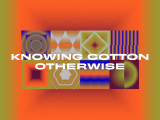
Cotton is perhaps the world's most well-known fabric, however, many stories behind cotton are lesser known. These untold and sometimes unexpected perspectives have been collected and brought together in the exhibition, Knowing Cotton Otherwise.
In the third and final chapter, Flipping the Script, designers Nsimba Valene Lontanga and Angelo Carlos Marcus Elizabeth take you on a journey through their heritage and culture while challenging you to reimagine fundamental concepts within the realm of fashion and design.
The exhibition unpacks and brings into question established ideas of 'classic' and 'basic' style staples, as well as redefining 'typically African' design and print. What happens when we reconsider our preconceived ideas of what cotton represents around the world?
Knowing Cotton Otherwise is open to the public until 16 October 2023 at the Fashion for Good Museum, Rokin 102, Amsterdam.
3 Ways to learn more about Amsterdam Smart City

Do you want to connect, learn, and exchange experiences about Amsterdam Smart City? We have designed programs to help you connect to Amsterdam’s innovation ecosystem and key learnings from projects in the Amsterdam metropolitan region. Here are our most popular programs:
Smart City the Amsterdam Way
We give you an overview of Amsterdam Smart City’s program, governance and key projects. It’s a light way to get introduced to it all in 1,5 hours and we can also offer this online.
Timing & cost: 1.5h hours, from €400 per groupAmsterdam Smart City Deep Dives
Go on a Deep Dive with Amsterdam Smart City and get to the bottom of the energy, mobility, digital city or circular economy transition during this customized 2,5 hour session with multiple experts from Amsterdam’s ecosystem.
Timing & cost: 2.5 hours, from €600 per groupSmart City Experience
Since 2016, Amsterdam Smart City has hosted more than 300 customized study programs, innovation journeys and trade missions from over 30 countries. With the Smart City Experience we offer tailor-made programs consisting of expert meetings and project visits connecting local and (inter)national stakeholders to the Amsterdam Smart City approach and innovation ecosystem. To request a Smart City Experience, send a request at least one month in advance to cornelia@amsterdamsmartcity.com.
Timing & cost: 6-8 hours, from €1,500 per group
Where do the Amsterdam Smart City Programs take place?
Most programs take place, or at least start at, the Smart City Lab on the Marineterrein Innovation District. This is a "small space for big ideas" where we showcase examples of smart city solutions from Amsterdam. The Smart City Experience Lab is also a workplace where Amsterdam Smart City partners meet and collaborate. Groups visiting the Experience Lab can also visit the Marineterrein Amsterdam Living Lab on their own or as a part of an organized program.
Exhibition: Knowing Cotton Otherwise - Bodies of Work

Last year we introduced Knowing Cotton Otherwise, a multidisciplinary exhibition, covering various aspects of this versatile fibre — from its burdened history to sustainable initiatives and innovative implementations worldwide. Through this new chapter, Bodies of Work, the experience of human bodies entangled in (forced) labour in the story of cotton are amplified. With the addition of works by Sha’Mira Covington and Tricia Nganga Mokosi, the exhibition explores some of the complex issues related to cotton's history and the use and re-use of this fabric in fashion and tech. The exhibition also showcases innovative technologies in material traceability and natural fibre recycling from Fashion for Good Innovators Oritain and Natural Fiber Welding. The continuation of the exhibition invites you to consider your own body as you move through space as a spectator in the narrative. How do you position yourself within the community of stories presented here?
OBA expositie: Digital Shadows

Welke sporen laat jij achter als je online gaat? Met vijf werken van lokale en internationale kunstenaars toont de expositie Digital Shadows van Waag Futurelab onze verstrengeling met digitale technologieën, sociale media en algoritmes. De werken werpen een nieuw licht op onze dagelijkse verhouding tot technologie.
Elke keer als we een digitale service gebruiken, laten we een digitale schaduw achter. Adverteerders en databedrijven tracken zorgvuldig je digitale schaduw: de websites die je bezoekt, de producten die je liked en de onderwerpen die je aandacht vasthouden. Hoe beter ze je kennen, hoe beter ze je kunnen benaderen met gepersonaliseerde producten of verleidelijke ideeën.
‘Schaduw’ hier betekent niet alleen de sporen die je achterlaat, maar ook de algoritmes en fysieke infrastructuur die vaak minder zichtbaar is. Deze tentoonstelling kijkt naar de gevolgen van de snelle digitalisering van onze levens, en de onbewuste vooroordelen die dat opwerpt in de schaduwen. Door verschillende internationale en lokale kunstenaars bij elkaar te brengen, werpt de expositie een licht op de kritische, speelse, feministische, futuristische en anti-commerciële kanten in de digitale wereld.
De schijnbaar onaantastbare digitale schaduw heeft altijd een fysieke evenknie. Hoewel niet altijd zichtbaar of herkenbaar, is de digitale en virtuele werkelijkheid gebouwd op de fysieke wereld — denk aan de servers, onderzeese kabels, de mineralen in je smartphone en de elektriciteit waarop je computer werkt. Deze tentoonstelling daagt je uit om na te denken welke materialen en interfaces we aanraken in de digitale ruimte. Welke vooronderstellingen, uitbuitingssystemen en afval creëren we hiermee? Kan het ook anders?
Wat te verwachten
Deze tentoonstelling bestaat uit vijf kunstwerken. Elk werk kietelt je brein om op een nieuwe manier na te denken over jouw digitale schaduw en de technologieën in je smartphone of laptop. We nodigen je uit om ze te bekijken en de interactie aan te gaan.
TheirTok (1) van Tomo Kihara (JP) onderzoekt op een speelse manier waarop algoritmes een profiel van je opbouwen en je aandacht vasthouden, om je data voor geld te verkopen aan reclamebedrijven. Gestures of Truthfulness (2) door Caroline Sinders (US/GB) kijkt naar hoe informatie op sociale media als ‘betrouwbaar’ wordt bestempeld, en de gebaren en scenografie waarmee iets als waarheid wordt gepresenteerd. Kunstenaar Lukas Engelhardt (DE/NL) duikt in de materialiteit van servers en de politieke relevantie van self-hosting met zijn werk Squatting the Cloud(3).
Ibiye Camps (GB) Behind Shirley (4) bekijkt de ontstaansgeschiedenis van raciale vooroordelen in gezichtsherkenningstechnologie en hoe je dit kunt tegengaan. Als onderdeel van zijn onderzoeksproject Disobedient Devices toont Dani Ploeger (NL) Een korte film, The Cults (5), met een sciencefiction perspectief op de toe-eigening van verouderde consumententechnologieën ('orodha' in Kiswahili) en de transformatie ervan tot apparaten met nieuwe toepassingen en betekenissen, een gangbare praktijk in Kenia.
Feestelijke opening
Kom je naar de feestelijke opening op vrijdagavond 9 december? We beginnen met een verdiepende panel talk met kunstenaars en experts, gevolgd door de officiële expo opening met een borrel en muziek!
Programma
15:30 - 17:00 uur: Panel talk met o.a. Ibiye Camp en Tomo Kihara (meld je hiervoor aan via de button)
17:30 - 19:00 uur: Officiële opening + borrel
Panel talk
In het openingspanel van Digital Shadows zullen deelnemende kunstenaars van de expositie samen met Waags onderzoeksdirecteur in gesprek gaan over prominente elementen van verantwoording in de sterk algoritmisch gemedieerde relaties die we in het digitale domein aangaan, bijvoorbeeld in de sociale media. Wie heeft de touwtjes in handen? Hoe kunnen we ons tegen die controle verzetten? Wat zijn de uitgangspunten of behoeften om het vertrouwen te herstellen? En wat is het gewenste beleid van aandacht?
Vanuit hun werken zullen de kunstenaars oplossingen presenteren om onopgemerkte elementen, de materialiteit en de gevolgen van de programmering van onze digitale systemen, zichtbaar en ervaarbaar te maken. Ze maken een cartografie van vooroordelen en controlemechanismen en voeren prefiguratief verzet en creatieve alternatieve manieren van relateren in de digitale transformatie uit.
meld je aan voor de panel talk
Workshops & rondleidingen
Als randprogrammering bij de tentoonstelling kun je je binnenkort inschrijven voor een workshop met kunstenaar Tomo Kihara op zaterdag 2 december om 14:00 uur. Daarnaast geven we rondleidingen in de OBA. De exacte data en tijden worden binnenkort bekend gemaakt.
Over deze expo
De tentoonstelling Digitale schaduwen is gecureerd door Waag Futurelab en mede gefinancierd en ondersteund door de Openbare Bibliotheek Amsterdam. Het is onderdeel van het Europese onderzoeksproject Artsformation, waarbij kunstenaars bijdragen aan het ontwerpen van meer open, eerlijke en inclusieve technologieën.
Knowing Cotton Otherwise
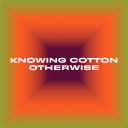
Exhibition Knowing Cotton Otherwise
Cotton is perhaps the world's most well-known fabric, however, many stories behind cotton are less known. These untold and sometimes unexpected perspectives have been collected and brought together in the exhibition, Knowing Cotton Otherwise. Centred on collectivity and community, local artists have been invited to present work that connects and intersects with different themes relating to the story of cotton. By mixing styles and stories, Knowing Cotton Otherwise creates a multifaceted experience, inviting you to reflect, question, play and wonder.
Fashion, art and social change
Built around different themes telling the story of cotton, the exhibition highlights the relationship between cotton and the fashion industry, the role of cotton in an increasingly intertwined web of global cultures, and the sustainable innovations driving its circular transformation. The exhibition provides questions such as where does cotton come from? How is it grown? What is the future of cotton and the role of innovation? How should we relate to the more questionable aspects of cotton, from its history of forced migration to more modern-day challenges? And how can we celebrate cotton, the connections it creates and the opportunities around it?
Collectivity and Community
Knowing Cotton Otherwise is presented in different phases throughout the year in which the exhibition grows and changes. The first phase features artists Benoît Gilles Michel, Caithlin Courtney Chong, Mario Gonsalves, Niño Divino, Noah Cohen, Nsimba Valene and Tasio Bidegain as well as the collectives OSSO Archive, Studio Papa and The Gang is Beautiful. The exhibition also showcases innovative technologies in material traceability and dyeing from Fashion for Good Innovators Oritain and Officina39. Knowing Cotton Otherwise invites you to question the content presented, examine your ideas and engage together in a process of self-reflection and critical consideration.
Interactive installation about sensors in the smart city

Discover how sensors make Amsterdam a smarter city. What measurements are taken and how is data being collected?
The Responsible Sensing Lab created the interactive installation Senses of Amsterdam that is currently exhibited at the public library of Amsterdam (OBA) location Slotermeer! Read more about this project on our website: https://responsiblesensinglab.org/news/senses-of-amsterdam-exhibited-at-oba-slotermeer
After traveling from NEMO Science Museum to Arcam, Senses of Amsterdam can now be visited free of charge at Slotermeerlaan 103E from Tuesday until Saturday.
The exhibition at OBA Slotermeer ends on 25 September 2022. Grab your chance!
Study Excursion: Trends and Innovation in Amsterdam’s Cycling Infrastructure
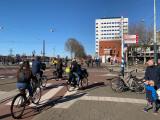
The excursions are delivered as a partnership between the Urban Cycling Institute (UCI) and Bicycle User Experience (BUX).
This two hour excursion brings you to key innovation sites in the central core of Amsterdam, starting at the Nieuwmarkt square in the city center, and ending at the Rijksmuseum. We curate stops at select sites that are representative of broader trends taking place in the city. We discuss changing directions of how the city views cyclists and the street, we show you best practices and- most importantly 😉 – we promise to challenge your preconceptions of how to plan for a cycling city. At the end, we provide different avenues for continued engagement and learning with us.
The study excursions take place from 16:00-18:00 most Saturdays in July and August*. The cost is €50 per person. There are 15 open spots per excursion. Participants need to arrange their own bicycle to take part.
Dates: July: 23, 31*(July 31st is a Sunday)
August: 6, 13, 20, 27
For full information and sign-up, visit the following link:
Expo: "Fashion Week: A New Era"
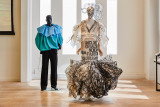
The expo: 'Fashion Week: A New Era' celebrates fashion through the years and explores how this phenomenon developed over time. How does the event influence the fashion industry? And what does the future hold for fashion week?
Every year during Fashion Week the latest fashion is shown on catwalks in Paris, Milan and New York and other metropoles across the globe. This iconic event has a major impact on the fashion industry and on our own wardrobes. In 'Fashion Week: A New Era', the Fashion for Good Museum unpacks the Fashion Week, delving into its past, present and future. View historic looks from the runways of Balenciaga, Versace, Moschino and many more; discover the innovative work of Dutch fashion designer Ronald van der Kemp and digital fashion house The Fabricant.
Responsible Sensing Lab op Arcam tentoonstelling Private_Eye_Butler_Spy

Afgelopen week is de tentoonstelling Private Eye Butler Spy geopend in Arcam. Hier zijn prototypes van 3 projecten van Responsible Sensing Lab te zien, een samenwerking van AMS Institute en gemeente Amsterdam. De tentoonstelling onderzoekt de impact van technologie in en rondom het huis.
De tentoonstelling
Toepassingen in en rond het huis worden steeds intelligenter: in plaats van een huissleutel bepalen toegangssystemen aan de hand van biometrische data of een deur opengaat. In de stad controleren scanauto’s of parkeergelden zijn betaald en registreren sensoren de drukte op straat of de luchtkwaliteit. De tentoonstelling Private_Eye_Butler_Spy onderzoekt de veranderende relatie tussen technologie en de mens. Aan de hand van verschillende thema’s verkennen bezoekers welke ethische vraagstukken en ontwerpopgaven een high-tech-toekomst met zich meebrengt.
Bezoeken
Private_Eye_Butler_Spy is gratis te bezoeken van 12 maart t/m 26 juni 2022 bij Arcam aan de Prins Hendrikkade 600.
Take a virtual tour of eco-hub de Ceuvel

At de Ceuvel we host private tours for interested individuals, schools, companies and other parties. Whether you’re an architect, technical engineer, a high school student, or just a generally interested person: there will be someone at de Ceuvel that can explain our story in a way that’s relevant to your background.
The tour covers the story of De Ceuvel. You will learn about sustainability & the circular economy, urban renewal strategies, architecture and communal experimentation and bottom-up development.
Our virtual tour of de Ceuvel was developed during the corona lockdown. Instead of physically visiting our site, we can show you around virtually! The online tour, or webinar, is conducted in a Zoom meeting. Our guide welcomes you in this virtual environment at a time and date of your convenience. Using photos, exclusive videos and illustrations unavailable elsewhere, we tell the story of our unique site. There will be ample time for questions and conversations with the live tour guide.
The virtual tour can be given to a large group of Zoom participants, or as a remote speaker during a physical event. It is suitable in various contexts: as a guest lecture for schools or universities, as a program item of an (online) sustainability conference, as part of a more extensive (company) training course, or in whatever setting you've designed.
Exhibition: Bits of You

Exhibition: Bits of You
The Studio presents the Bits of You exhibition. This new exhibition, which is intended for adult audiences, conveys a sense of how our lives are being impacted by the data traces we leave behind each and every day. It also shows how this differs from one person to another.
Step by step, the exhibition’s six pavilions will give you a sense of how our data is processed by algorithms to generate a range of predictions about our identity and behaviour. Immerse yourself in a vortex of data rings, browse through a gender recognition algorithm, develop a feel for the subtle impact of digital profiles, and get a glimpse of a data-driven future. Encounter ten people who each describe a different data experience, then ask yourself ‘Do I really resemble my digital profile?’.
TechLab
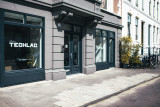
Located in the Plantage area of Amsterdam, a new exhibition space featuring cool new innovations in technology has recently opened.
The gallery space contains many exhibits dedicated to augmented reality, virtual reality, artificial intelligence, 3D printing and robotics. Each station is interactive and playful, ensuring visitors will have fun while learning about these various technologies.
Based around the theme of sustainability, the space shows how we can use technology as a resource to improve not only our lives but our world. Be sure to check out this unique educational tech gallery!
THE YIMBY EXPERIENCE!
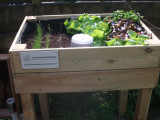
THE YIMBY Yes-In-My-Back-Yard EXPERIENCE! is a bottom-up movement aiming at small scale food growing in cities. THE YIMBY EXPERIENCE! started in 2013 in the city of Arnhem in the Netherlands. The YIMBY EXPERIENCE! is expanding with the support of the city of Arnhem and local sponsors.
Eight years of THE YIMBY EXPERIENCE! shows the empowerment of citizens.: Citizens who started with a small food platform have grown to larger urban food growers. Citizens are more aware of the relation between season and growing and adapt their buying of seasonal food in the supermarket. Citizens gained green growing knowledge and have more green connections in their neighbourhood.
Interested? Take a look at the following YouTube film (2 minutes)
https://youtu.be/0_JWmuhwyR4
Green Urban Living Lab Arnhem

The Green Urban Living Lab Arnhem provides a innovative, cooperative learning and co-creating enviroment, in which multiple stakeholders jointly test, develop and create green metropolitan solutions.
Data Science for Smart Cities
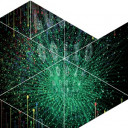
Responsible Data Science for Smart Cities; Can cities collect massive amounts of data on its residents and their daily practices, and yet remain safe, transparent and democratic? Today, cities are collecting more and more data, and the city of Amsterdam is at the forefront of publishing such "city data” and launching data driven services to improve its liveability. For example, data on the increasing use of electric charging points, smart waste collection systems, and good traffic flow can all be used to reduce costs and minimise waste. In this master class we provide an overview to the way Big Data is being used to make challenges in the city of Amsterdam more transparent and to develop new solutions. The master class is based on the work of Nanda Piersma, special lecturer in Big Data in the city at the HvA (the Faculty of Technology and the Faculty of Digital Media and Creative Industry).
Responsible Data Science for Smart Cities
Can cities collect massive amounts of data on its residents and their daily practices, and yet remain safe, transparent and democratic? Today, cities are collecting more and more data, and the city of Amsterdam is at the forefront of publishing such "city data” and launching data driven services to improve its liveability. For example, data on the increasing use of electric charging points, smart waste collection systems, and good traffic flow can all be used to reduce costs and minimise waste.
In this masterclass we provide an overview to the way Big Data is being used to make challenges in the city of Amsterdam more transparent and to develop new solutions. The masterclass is based on the work of Nanda Piersma, special lecturer in Big Data in the city at the HvA (the Faculty of Technology and the Faculty of Digital Media and Creative Industry).
Become a Circular Entrepreneur

Around the First European Upcycle Centre in Almere De Steiger you see what happens when you base your activities on the assumption that ‘waste’ is a human invention. Many innovative entrepreneurs are setting up their new businesses re-using materials and thinking in a collaborative way. Learn how we ended up in the Cities as they are today and learn how to become a more circular organisation yourself.
Around the First European Upcycle Centre you see what happens when you base your activities on the assumption that ‘waste’ is a human invention. Many innovative entrepreneurs are setting up their new businesses re-using materials and thinking in a collaborative way. This vibrant and energetic yet circular economy is getting attention of international visitors.
At Almere - De Steiger the first European Upcycle Centre was opened in January 2018. During the short period the centre has opened their doors, it has attracted many people from various backgrounds such as circular economy- and social impact entrepreneurs, designers, craftsmen, tech & Smart City entrepreneurs and many curious visitors from all over the world. Innovation is their daily food.
When you visit Almere De Steiger, or ‘AllyTown’ as the city is sometimes called, you’ll witness what happens when you bring together entrepreneurs with a focus on circular and sustainable business models.
Examples of people you’ll meet are
- Craftsmen, producing unique circular marketing products,
- Craftsmen, producing unique and trendy lamps and furniture,
- Providers of sustainable and circular Smart Energy solutions,
- Designers and Manufacturers of Smart & Sustainable Fashion,
- Innovators sharing knowledge regarding entrepreneurship and new tech,
- Students with a focus on Tech, Sustainability and Circularity
- Smart City Designers & Architects
- ...
During the visit you’ll get an interactive talk of an experienced entrepreneur about innovation and entrepreneurship in a circular economy. Next to that you will go on a tour and visit 2-4 circular entrepreneurs who will explain how they work in this ecosystem, what their product looks like and how they make a living from their circular organisations.
Almere - De Steiger is not just a circular hub, it is a circular economic hub and is slowly becoming an example for others too. Many national and international celebrities have found this area for the unique handcrafted and sustainable products.
A standard visit complies:
- Presentation about the innovation journey to Smart Cities Today
How did we get to the point where the world is today? What trends do we see to make our world more sustainable and what can you do to help? - Interactive sessions with innovative & circular entrepreneurs examples are:
- Total solution for Circular & Sustainable households,
- Unique handcrafted Circular Marketing Materials,
- Smart Fashion (3D)/Circular Fashion,
- Upcycled trendy lamps & furniture
- New Tech developments
The visit can be accommodated to individual requests and can be enriched with sessions such as:
- running circular workshops: how to make your business more circular, learn from experts;
- start-up sessions such as coaching or pitch events;
- run a design sprint to solve complex (business) problems in a sustainable & circular way;
- Learn how to innovate by using new technologies such as Blockchain, Artificial Intelligence, Internet of Things, 3D technologies or Robotics;
- visit the circular ateliers of the local entrepreneurs
Almere De Steiger is easily accessible by both car and public transport and is situated next to the Floriade area.
Want to book the tour? Mail to manuela@krullsolutions.com
Contemporary Amsterdam and its challenges

Introduction to the Amsterdam urban region and its major policy challenges. How has the city developed in the last decades and what are the major policy issues at the moment regarding economic, social and spatial development? How does the city government attempt to involve citizen knowledge in its development?
Introduction to the Amsterdam urban region and its major policy challenges. How has the city developed in the last decades and what are the major policy issues at the moment regarding economic, social and spatial development? How does the city government attempt to involve citizen knowledge in its development?
Evaluating smart city projects: Lessons from Amsterdam
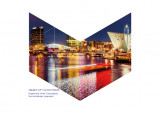
This lecture is based on University of Applied Sciences research evaluating smart city projects with a focus on non-technological aspects, including forms of cooperation and partnerships, business models and scaling potential. The focus is on key lessons learned and factors for success for setting up and scaling multi-stakeholder smart city projects. Benchmark Amsterdam-based projects and learn the factors for success for developing, launching, and scaling up multi-stakeholder smart city projects.
This lecture is based on University of Applied Sciences research evaluating smart city projects with a focus on non-technological aspects, including forms of cooperation and partnerships, business models and scaling potential. The focus is on key lessons learned and factors for success for setting up and scaling multi-stakeholder smart city projects. Benchmark Amsterdam-based projects and learn the factors for success for developing, launching, and scaling up multi-stakeholder smart city projects.
Stay up to date
Get notified about new updates, opportunities or events that match your interests.

